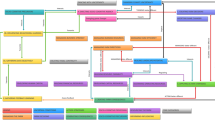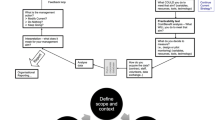Abstract
Agricultural production in the Canadian Prairies is expected to be negatively affected as climate change projections for the region indicate warmer temperatures, greater incidence and severity of extreme weather events, and reduced water availability and soil moisture. To understand climate change adaption, it is important to explore the learning process that underlies farmer’s adaptation practices in the region. Prairie farmers’ learning was analyzed using Transformative Learning Theory whereby learning is categorized into three types: instrumental, communicative, and transformative. All producers learned instrumentally to some degree, but farmers who placed less emphasis on maximizing economic returns generally showed secondary learning outcomes correlating economic and environmental benefits. Communicative learning was mainly limited to producer-producer dialogue to the exclusion of other organizational and institutional players in the agricultural system. Critical reflection was explored as an important precursor to transformative learning. Strong evidence of transformative learning was rare (observed in 11% of farmers), but indicators of transformative learning were diverse and was observed in 43% of farmers. Transformative learning is believed to be important for flexible decision-making and autonomous thinking, making it advantageous for responding to changing environmental conditions. The analysis shows that a large number of information sources, and communication of information in an experiential and observable way, is conducive to transformative learning. Adaptation to environmental uncertainty, resulting from changing climatic conditions, may be most effectively dealt with when individual farmers undergo transformative learning whereby underlying assumptions that govern actions, values, and claims to knowledge are questioned.


Similar content being viewed by others
References
AAFC (Agriculture and Agri-Food Canada) (2008) An overview of the Canadian agriculture and agri-food system. http://www4.agr.gc.ca/AAFC-AAC/display-afficher.do?id=1228246364385&lang=eng. Cited 21 May 2010
AAFC-PFRA (Agriculture and Agri-Food Canada and Prairie Farm Rehabilitation Administration) (2003) Analysis of agricultural water supply issues—Prairie provinces national water supply expansion program. http://www4.agr.gc.ca/AAFC-AAC/display-afficher.do?id=1207347576776&lang=eng. Cited 21 May 2010
Adger WN (2000) Social and ecological resilience: are they related? Prog Hum Geogr 24:347–364
Armitage D, Berkes F, Doubleday N (2007) Moving beyond co-management. In: Armitage D, Berkes F, Doubleday N (eds) Adaptive co-management: collaboration, learning and multi-level governance. UBC Press, Vancouver
Barnett TP, Adam JC, Lettenmaier DP (2005) Potential impacts of a warming climate on water availability in snow-dominated regions. Nature 438:303–309
Berkes F (2002) Cross-scale linkages: perspectives from the bottom up. In: Ostrom E, Dietz T, Dolšak N, et al (eds) The drama of the commons. Committee on the Human Dimensions for Global Change. Division of Behavioral and Social Sciences and Education, National Academy Press, Washington, DC
Berkes F (2008) Climate change and indigenous ways of knowing. In: Berkes F (ed) Sacred ecology, 2nd edn. Routledge, New York
Berkes F, Armitage D, Doubleday N (2007) Synthesis: adapting, innovating, evolving. In: Armitage D, Berkes F, Doubleday N (eds) Adaptive co-management: collaboration, learning and multi-level governance. UBC Press, Vancouver
Brklacich M, Bryant C, Veenhof B et al (1998) Implication of global climatic change for Canadian agriculture: a review and appraisal of research from 1984 to 1997. In: Koshida G, Avis E (eds) The Canada country study: climate impacts and adaptation. Volume 7. National sectoral volume, Environment Canada, Environmental Adaptation Research Group, Toronto, Canada, pp 219–256
Dietz T, Ostrom E, Stern P (2003) The struggle to govern the commons. Science 302:1907–1912
Dirkx JM (1998) Transformative learning theory in the practice of adult education: an overview. PAACE J Lifelong Lear 7:1–14
Easterling WE (1996) Adapting North American agriculture to climate change in review. Agric For Meteorol 80:1–54
Environment Canada (2010) Canadian climate normals or averages 1971–2000. http://www.climate.weatheroffice.gc.ca/climate_normals/index_e.html. Cited 19 August 2010
Fisk JW, Hesterman O, Thorburn TL (1998) Integrated farming systems: a sustainable agriculture learning community in the USA. In: Roling NG, Wagemakers MAE (eds) Facilitating sustainable agriculture: participatory learning and adaptive management in times of environmental uncertainty. Cambridge University Press, UK
Folke C (2003) Social-ecological resilience and behavioural responses. In: Hansson B, Biel A, Mårtensson M (eds) Individual and structural determinants of environmental practice. Ashgate, UK
Folke C, Colding J, Berkes F (2003) Synthesis: building resilience and adaptive capacity in social-ecological systems. In: Berkes F, Colding J, Folke C (eds) Navigating social–ecological systems: building resilience for complexity and change. Cambridge University Press, Cambridge
Gerber A, Hoffman V (1998) The diffusion of eco-farming in Germany. In: Roling NG, Wagemakers MAE (eds) Facilitating sustainable agriculture: participatory learning and adaptive management in times of environmental uncertainty. Cambridge University Press, UK
Granovetter M (1983) The strength of weak ties: a network theory revisited. Sociol Theory 1:201–233
IPCC (2007) Assessment of adaptation practices, options, constraints and capacity. Climate change 2007: impacts, adaptation and vulnerability. Contribution of Working Group II to the Fourth Assessment Report of the Intergovernmental Panel on Climate Change, Cambridge University Press, UK
Kerton S, Sinclair AJ (2009) Buying local organic food: a pathway to transformative learning. Agric Human Values. doi:10.1007/s10460-009-9233-6
Kulshreshtha SN (2005) Secondary economic impacts of the agricultural droughts in Canada. In: Wheaton E, Kulshreshtha S,Wittrock V (eds) Canadian droughts of 2001 and 2002: climatology, impacts and adaptations. Technical report prepared for Agriculture and Agri-Food Canada. SRC Publication No. 11602–37E03, Saskatchewan Research Council, Saskatoon, Canada
Lapp S, Byrne J, Townshend I et al (2005) Climate warming impacts on snowpack accumulation in an alpine watershed. Int J Climatol 25:521–536
Lemmen DL, Warren FJ (2004) Climate change impacts and adaptation: a Canadian perspective. http://adaptation.nrcan.gc.ca/perspective/pdf/report_e.pdf. Cited 21 May 2010
Mezirow J (1994) Understanding transformative theory. Adult Educ Q 44:222–223
Mezirow J (1995) Transformation theory of adult learning. In: Welton MR (ed) In defence of the life-world. State University of New York Press, Albany
Mezirow J (1997) Transformative learning: theory to practice. New Dir Adult Contin Educ 74:5–12
Mezirow J (2000) Learning as transformation: critical perspectives on a theory in progress. Jossey-Bass, San Francisco
Olsson P, Berkes F, Folke C (2004) Adaptive co-management for building resilience in social-ecological systems. Environ Manage 34:75–90
Owuor B, Eriksen S, Mauta W (2005) Adapting to climate change in a dryland mountain environment in Kenya. Mt Res Dev 25:310–315
Percy R (2005) The contribution of transformative learning theory to the practice of participatory research and extension: theoretical reflections. Agric Hum Values 22:127–136
Pretty JN (1995) Participatory learning for sustainable agriculture. World Dev 23:1247–1263
Pretty JN (1998) Supportive policies and practice for scaling up sustainable agriculture. In: Roling NG, Wagemakers MAE (eds) Facilitating sustainable agriculture: participatory learning and adaptive management in times of environmental uncertainty. Cambridge University Press, UK
Roling NG, Jiggins J (1998) The ecological knowledge system. In: Roling NG, Wagemakers MAE (eds) Facilitating sustainable agriculture: participatory learning and adaptive management in times of environmental uncertainty. Cambridge University Press, UK
Sauchyn DJ, Stroich J, Beriault A (2003) A paleoclimatic context for the drought of 1999–2001 in the northern Great Plains of North America. Geogr J 169:158–167
Simonovic SP, Li L (2004) Sensitivity of the Red River Basin flood protection system to climate variability and change. Water Resour Manag 18:89–110
Sims LC, Sinclair AJ (2008) Learning through participatory programs: case studies from Costa Rica. Adult Educ Q 58:151–168
Sinclair AJ, Diduck AP (2001) Public involvement in EA in Canada: a transformative learning perspective. Environ Impact Assess Rev 21:113–136
Sinclair AJ, Diduck AP, Fitzpatrick P (2008) Conceptualizing learning for sustainability through environmental assessment: critical reflections on 15 years of research. Environ Impact Assess Rev 28:415–428
Smit B, Skinner MW (2004) Adaptations options in agriculture to climate change: a typology. Mitig Adapt Strateg Glob Change 7:85–114
Smit B, Wall SE, Wandel J (2007) Farming in a changing climate: agricultural adaptation in Canada. UBC Press, Vancouver
Somers N (1998) Learning about sustainable agriculture: the case of Dutch arable farmers. In: Roling NG, Wagemakers MAE (eds) Facilitating sustainable agriculture: participatory learning and adaptive management in times of environmental uncertainty. Cambridge University Press, UK
Statistics Canada (2007) Total farm area, land tenure and land in crops, by province (Census of Agriculture, 1986 to 2006). http://www40.statcan.gc.ca/l01/cst01/agrc25a-eng.htm. Cited 21 May 2010
Swanson DA, Bhadwal S (2009) Creating adaptive policies: a guide for policymaking in an uncertain world. The International Institute for Sustainable Development, The Energy and Resources Institute, and The International Development Research Centre. Sage, New Delhi (in press)
Swanson, DA, Hiley JC, Venema HD et al (2007) Indicators of adaptive capacity to climate change for agriculture in the Prairie region of Canada: an analysis based on Statistics Canada’s Census of Agriculture. Working Paper for the Prairie Climate Resilience Project, International Institute for Sustainable Development, Winnipeg
Tarnoczi TJ (2009) Climate change in the Prairie agro-ecosystem: information exchange and producer-level learning. Dissertation. University of Manitoba. http://www.umanitoba.ca/institutes/natural_resources/pdf/theses/Masters%20Thesis%20Tarnoczi%202009.pdf
Tarnoczi TJ, Berkes F (2009) Sources of information for farmers’ adaptation practices in Canada’s Prairie agro-ecosystem. Clim Change 98:299–305
Taylor E (2007) An update of transformative learning theory: a critical review of the empirical research (1999–2005). Int J Lifelong Educ 26:173–191
Thomas DSG, Twyman C (2005) Equity and justice in climate change adaptation amongst natural-resource-dependent societies. Glob Environ Change 15:115–124
Tompkins EL, Adger WN (2004) Does adaptive management of natural resources enhance resilience to climate change? Ecol Soc. www.ecologyandsociety.org/vol9/iss2/art10. Cited 23 August 2010
Veeman TS, Veeman MM (1997) Conserving water in irrigated agriculture: the economics and valuation of water rights. Rural Economy Project Report 97-0, Department of Rural Economy, University of Alberta, Edmonton, Canada
Weperen WV, Proost J, Roling NG (1998) Integrated farming in the Netherlands. In: Roling NG, Wagemakers MAE (eds) Facilitating sustainable agriculture: participatory learning and adaptive management in times of environmental uncertainty. Cambridge University Press, UK
Wheaton E, Kulshreshtha S, Wittrock V et al (2008) Dry times: hard lessons from the Canadian drought of 2001 and 2002. Can Geogr 52:241–262
Acknowledgements
I would like to extend my gratitude to the many farmers who participated in this research, Fikret Berkes and John Sinclair (University of Manitoba), and Henry Venema and Darren Swanson (International Institute for Sustainable Development). I would also like to thank my parents, Allan and Linda, for their support and encouragement throughout the research process. Tarnoczi’s work was supported by a Manitoba Graduate Scholarship, the Canadian Social Sciences and Humanities Research Council, and the Canada Research Chairs program.
Author information
Authors and Affiliations
Corresponding author
Rights and permissions
About this article
Cite this article
Tarnoczi, T. Transformative learning and adaptation to climate change in the Canadian Prairie agro-ecosystem. Mitig Adapt Strateg Glob Change 16, 387–406 (2011). https://doi.org/10.1007/s11027-010-9265-7
Received:
Accepted:
Published:
Issue Date:
DOI: https://doi.org/10.1007/s11027-010-9265-7




